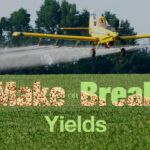For Best Results, Tackle Peanut Diseases From All Angles
A comprehensive disease management plan including preventive fungicide applications can protect peanut yields from Mother Nature’s curveballs.

The warm, humid climate in the Southeast can be a mixed bag for growers. On one hand, these conditions are ideal for producing high-yielding peanut crops. On the other, many diseases favor these conditions, creating an ongoing management challenge.
While their arrival time may vary, you can count on many of the same peanut diseases to show up year after year. Crop rotation plays a key role in white mold management, as Sclerotium rolfsii, its causal agent, remains in the soil between plantings and can quickly infest the next season’s crop. Leaf spot complex (early and late leaf spot) and Rhizoctonia are frequently found in fields as well. Without proper management, these diseases can cause poor stands and drastically lower yields, especially together.
When planning disease management programs, weather conditions are an important consideration. Tropical conditions like hurricanes can keep you out of your fields for days at a time and delay fungicide applications. Flexible solutions are necessary to produce high-yielding peanut crops in these dynamic conditions. Proven fungicides with long-lasting protection are a must.
Miravis® fungicide, powered by ADEPIDYN® technology, provides long-lasting preventive protection from disease, offering 21-28 days of control. Elatus® contains active ingredients SOLATENOL® and azoxystrobin, both of which provide preventive protection against soilborne and foliar diseases, including white mold.
When used together, Miravis and Elatus provide growers with one of the strongest long-lasting, broad-spectrum disease control options available. The ideal application time is around 60 days and again around 90 days after planting. This is the window when peanut plants are achieving their full growth potential and putting down pegs which will become pods.
Miravis and Elatus also help reduce trips across the field. A five-spray fungicide program with Miravis and Elatus provides better disease control and significantly helps increase yield potential compared to traditional six- and seven-spray programs.

For added insurance, Alto® 100 SL fungicide is a good choice to follow a Miravis and Elatus program. A powerful triazole, Alto provides curative control of a variety of plant diseases. Alto also offers flexible application timing and is tank-mix friendly, making it a convenient option that can be used under a variety of conditions.
- The warm, humid climate in the Southeast provides a favorable environment for peanut diseases.
- Growers need flexible solutions to reliably manage disease even when storm conditions delay fungicide applications.
- Programs that contain Miravis® and Elatus® fungicides deliver better disease control in fewer applications than traditional programs.























